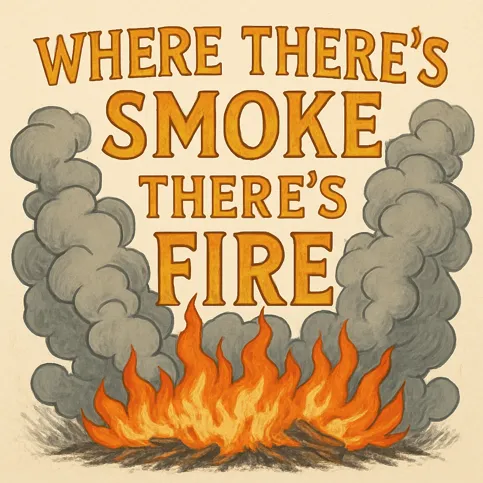What is the meaning of the phrase ‘where there’s smoke, there’s fire’?
If there are signs that something is true, then it must be at least partly true.
What is the origin of the phrase ‘where there’s smoke, there’s fire’?
The phrase ‘where there’s smoke, there’s fire’ is a particularly old one that dates back as far as 43 BCE, almost two thousand years ago when it appeared in Cicero’s writings, where he referred to the connection between smoke and fire in a literal and metaphorical sense. The proverb was originally understood to mean that visible signs (smoke) indicate the presence of a hidden problem or reality (fire).At first the phrase was always used in the literal sense.
The popularity of the phrase really began to take off in the 16th century, in England, UK when the phrase became widely used as a metaphor. The saying became a way to convey the idea that when there are persistent rumours or indicators of wrongdoing, there is likely some truth behind them.
The phrase is also found in various forms across cultures and languages, emphasising its universal appeal. For instance, a similar saying exists in French: “Il n’y a pas de fumée sans feu” (There is no smoke without fire).
What are some notable uses of the phrase ‘where there’s smoke, there’s fire’?
Thomas Fuller, a 17th-century English churchman and historian, included a variation of the phrase in his collection of proverbs, which provides historical evidence of its usage during that time.
The phrase is frequently used in political commentary, especially in discussions about scandals. For instance, during the Watergate scandal in the 1970s, many journalists and commentators referred to “where there’s smoke, there’s fire” to justify their investigations into the Nixon administration before the full extent of the scandal was revealed.
Hillary Clinton used a variation of this phrase during the 1990s Whitewater controversy when she remarked on how people often believed in the existence of a scandal simply because there was talk of one. She implied that not all rumours or smoke lead to fire, yet the expression itself highlights that persistent smoke often indicates some truth.
While the phrase fits into legal contexts, it isn’t a formal legal term but is often used metaphorically by lawyers, judges, and investigators. It has also appeared in crime dramas, political thrillers, and legal shows, often when characters are working to uncover hidden truths.
The phrase has been referenced in song lyrics. For example, in Billy Joel’s song “We Didn’t Start the Fire”, though the title is metaphorical, it carries a similar sense — events and scandals happen, whether or not you want them to, and the signs often point to larger consequences. It reflects the notion that large social and political events have their roots in earlier developments, just as a fire has smoke as its early warning sign.

